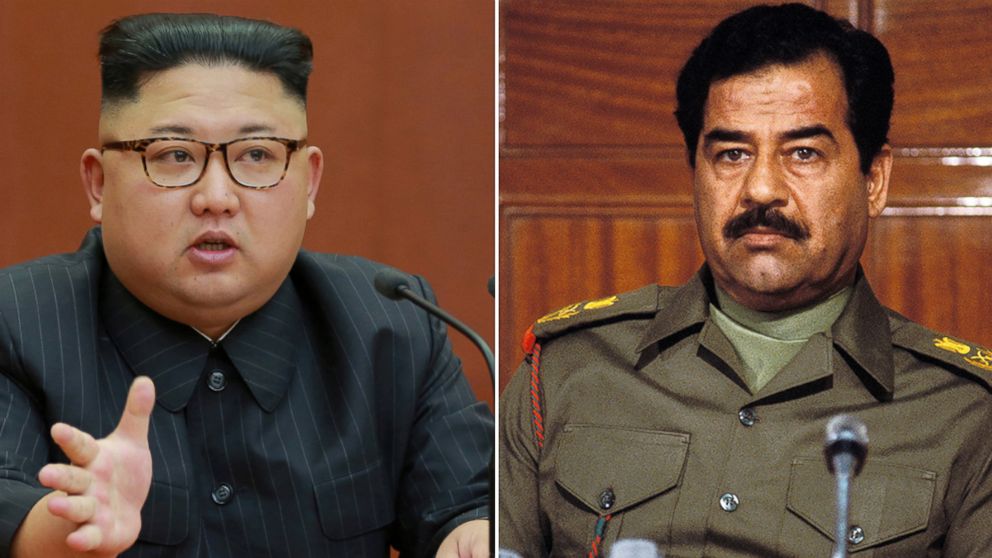ANALYSIS: Anyone counting on Kim Jong Un to avoid suicide should remember Saddam Hussein
The similarities between Hussein and Kim are substantial.

— -- Pondering the possibility of a nuclear war with North Korea is so frightening that any rational person looks for assurances that it won’t actually happen. It can’t happen.
Yes, we would “win” the physical conflict, but the cost to human life and the impact on America, and the world, would be so apocalyptic that it would call into question the use of the word “victory” when applied to nuclear war.
The Cassandras who fear cataclysm on the Korean peninsula are often offered the psychological argument that Kim Jong Un is a survivor, with the singular goal of keeping himself and his family in power.
That seems to offer some comfort that he will be rational enough to stop him from entering a suicidal war with the United States where he would lose both the power that serves as his lifeblood and that blood itself.
I rely on those assessments from experts on the region to allow me to sleep at night. But lately I have been lying awake thinking about one person: Saddam Hussein, a man who also seemed obsessed with retaining power and his honor. And a man who, like Kim Jong Un, was described as a rational actor, not a madman, before he recklessly and fatally stood up to the United States despite a pre-ordained outcome.
ForeignPolicy.com published a well-researched and thoughtful assessment of Kim Jong Un earlier this year with the headline: Kim Jong Un Is a Survivor, Not a Madman: North Korea’s behavior might seem irrational to outsiders, but the Kim regime is just taking logical actions to survive.
Looking back at how Hussein was characterized well before his defeat, arrest and death, I quickly found a 1991 Los Angeles Times article by a professor of psychology and long-time CIA analyst who presented a profile of Hussein to the House Armed Services and Foreign Affairs committees, Dr. Jerrold Post. It offers haunting similarities to the North Korean dictator.
“The violence and aggression that have marked Saddam Hussein‘s career have led him to be characterized –- mostly in the West -– as a madman,” Post said in the article.
The next sentence is even more striking for showing similarities between the two dictators.
“In fact, there is no evidence that Saddam is suffering from a psychotic disorder,” Post said. “He is a shrewd and ruthless political calculator, by no means irrational, but dangerous to the extreme.”
“There is no evidence Saddam is constrained by conscience,” he continued. “He uses whatever force is necessary, and will, if he deems it expedient, go to extremes of violence, including the use of weapons of mass destruction.”
Both killed scores of people, including friends and family members to keep a firm grip on power. Not because they were “crazy” per se, but in response to even a hint, no matter how far-fetched, of any potential threat to their control and power. Each invoked a variety of invented political and legal justifications to try to explain his barbarity.
And their lenses are similarly parochial and myopic: “He is surrounded by sycophants who are cowed by his reputation for brutality and afraid to criticize him,” Post said about Hussein in 1991.
Kim Jong Un is regularly characterized in a similar fashion.
In 2011, Scientific American, citing psychological studies, compared Saddam, Hitler and Kim Jong Un’s father Kim Jong Il and concluded that:
“Kim Jong-il had more in common with Saddam Hussein (their profiles had a correlation of .67) than with Hitler (their profiles had a correlation of .20). Indeed, both Jong-il and Hussein had sadistic personality disorder as their highest rated item, and their scores were nearly identical – more than three standard deviations above the population average.”
Sure, there are relevant distinctions between Kim Jong Un and Saddam Hussein in terms of everything from their upbringing to the warped forces driving them, but it’s the final paragraph of that 1991 article that frightens me most as it foreshadowed the future: “Intoxicated by the elixir of power and the acclaim of the Arab masses, Saddam will not yield. He is willing to shed the last drop of the Iraqi people’s blood in pursuit of his revolutionary destiny.”
Looking back more than a decade later, Post turned out to be spot on.
How this comparison ought to impact U.S. policy regarding North Korea is for the experts to determine. Kim Jong Un is well aware of what happened to Saddam and Libyan dictator Muammar Gaddafi after he gave up his nuclear weapons program. Now, he is apparently counting on North Korea’s nuclear program to protect him from a similar fate.
But simply allowing them to continue advancing those weapons -- and also potentially selling them to other rogue actors -- isn’t a long term option.
So the question may become not if, but when, some confrontation occurs. At that point, one would hope, it would be on our terms after careful deliberation -- not based on some accidental confrontation or overreaction to taunting the “little rocket man.” If mocking Kim was part of a broader strategy then so be it, but thus far there’s nothing (that we know of) to support that contention.
Regardless, our limited history with an allegedly non-madman, “rational” despotic dictator suggests that these types may be literally willing to go the depths of hell before caving to pressure. Recognizing that doesn’t mean we are cowed by Kim’s rhetoric, it does mean we appreciate the gravity of the stakes and cannot count on him to behave the way a rational actor should to avoid a suicidal confrontation. Unlike the showdown with Saddam, this one would have an immediate and potentially cataclysmic impact on all of us around the globe.
I hope and pray that we think, and act, accordingly.
Dan Abrams is ABC News' Chief Legal Analyst.
A version of this article originally appeared on mediaite.com


